 1 citations,
May 2022 in “Frontiers in Pharmacology”
1 citations,
May 2022 in “Frontiers in Pharmacology” Astilbin can potentially calm overactive immune responses, like in Type 1 Diabetes, by suppressing certain cell activities and reducing inflammation.
1 citations,
November 2021 Non-invasive methods can effectively monitor skin inflammation and cancer biomarkers.
 1 citations,
October 2021 in “Clinical, Cosmetic and Investigational Dermatology”
1 citations,
October 2021 in “Clinical, Cosmetic and Investigational Dermatology” Vitamin B3 may help prevent hair loss and promote hair growth by protecting scalp cells from stress and reducing hair growth-blocking proteins.
1 citations,
September 2018 in “International journal of research - granthaalayah” Human hair medulla doesn't break down hydrogen peroxide, which may affect hair color formation.
 1 citations,
January 2009 in “Elsevier eBooks”
1 citations,
January 2009 in “Elsevier eBooks” The document concludes that a deeper understanding of skin aging and photodamage is needed to create better skin treatments.
January 2025 in “Pharmaceuticals” Nanocarriers can improve antioxidant delivery to the skin but face safety and production challenges.
 January 2025 in “Cosmetics”
January 2025 in “Cosmetics” Astragalus sinicus extracts may help promote hair growth and treat hair loss.
 December 2024 in “Cell Communication and Signaling”
December 2024 in “Cell Communication and Signaling” Fat tissue vesicles protect skin from UV damage better than stem cell vesicles.
 December 2024 in “ACS Applied Materials & Interfaces”
December 2024 in “ACS Applied Materials & Interfaces” The new hydrogel helps heal diabetic wounds by reducing inflammation and improving tissue repair.
 November 2024 in “International Journal of Molecular Sciences”
November 2024 in “International Journal of Molecular Sciences” Nanoparticles may improve caffeine delivery for hair growth, offering a potential alternative to minoxidil for hair loss treatment.
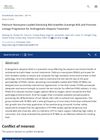 October 2024 in “Small Methods”
October 2024 in “Small Methods” Platinum nanozyme microneedles can effectively and safely promote hair growth for androgenetic alopecia.
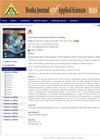 October 2024 in “Benha Journal of Applied Sciences”
October 2024 in “Benha Journal of Applied Sciences” Androgenetic alopecia is linked to aging due to inflammation, oxidative stress, and hormonal changes.
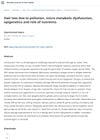 September 2024 in “Brazilian Journal of Hair Health”
September 2024 in “Brazilian Journal of Hair Health” Nutrients can help improve hair growth and thickness caused by pollution.
September 2024 in “Journal of Ethnopharmacology” Terminalia bellirica extracts effectively promote hair regrowth and treat androgenetic alopecia.
 July 2024 in “Clinical Cosmetic and Investigational Dermatology”
July 2024 in “Clinical Cosmetic and Investigational Dermatology” Non-drug therapies show promise for hair regrowth but need more research.
 June 2024 in “International journal of biological macromolecules”
June 2024 in “International journal of biological macromolecules” The hydrogel effectively stops bleeding and heals diabetic wounds quickly.

Ganoderma lucidum extract may help treat stress-related hair loss.
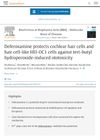 March 2024 in “Biochimica et biophysica acta. Molecular basis of disease”
March 2024 in “Biochimica et biophysica acta. Molecular basis of disease” Deferoxamine may help protect inner ear cells from damage caused by oxidative stress.
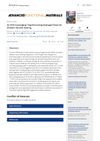 February 2024 in “Advanced Functional Materials”
February 2024 in “Advanced Functional Materials” The hydrogel patch helps heal diabetic wounds by releasing a healing agent in response to harmful molecules and improving skin regeneration.
 February 2024 in “Journal of Cellular and Molecular Medicine”
February 2024 in “Journal of Cellular and Molecular Medicine” A hydrogel releasing pectolinarin speeds up wound healing and reduces scarring.
 January 2024 in “Annals of Dermatology”
January 2024 in “Annals of Dermatology” Korean Red Ginseng may help protect hair from damage and promote growth.
 October 2023 in “International Journal of Pharmaceutics”
October 2023 in “International Journal of Pharmaceutics” Using minoxidil with tocopherol acetate in ethosomes improves hair regrowth in hair loss treatment.
 August 2023 in “International Journal of Nanomedicine”
August 2023 in “International Journal of Nanomedicine” A new wound healing treatment using a graphene-based material with white light speeds up healing and reduces infection and scarring.
 July 2023 in “International Journal of Molecular Sciences”
July 2023 in “International Journal of Molecular Sciences” N,N-Dimethylglycine Sodium Salt helps reduce skin inflammation and improves skin cell growth and healing.
 June 2023 in “Antioxidants”
June 2023 in “Antioxidants” Lipids from Schizochytrium sp. help prevent hair loss by protecting hair cells from damage and promoting hair growth.
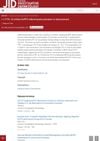 April 2023 in “Journal of Investigative Dermatology”
April 2023 in “Journal of Investigative Dermatology” PX-12 may help treat psoriasis by blocking inflammation and cell death.
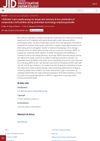 April 2023 in “Journal of Investigative Dermatology”
April 2023 in “Journal of Investigative Dermatology” Compounds A and B help men's skin recover faster by reducing oxidative damage and increasing energy levels.
 April 2023 in “Journal of Investigative Dermatology”
April 2023 in “Journal of Investigative Dermatology” Ganoderma lucidum extract can potentially reduce stress-induced hair loss by slowing down premature hair aging and removing harmful substances.
 April 2023 in “The journal of investigative dermatology/Journal of investigative dermatology”
April 2023 in “The journal of investigative dermatology/Journal of investigative dermatology” Activating mitophagy may help manage a key immune response involved in the hair loss condition alopecia areata.
 January 2023 in “Journal of Ravishankar University”
January 2023 in “Journal of Ravishankar University” Hair loss can be caused by stress, aging, and harmful substances that create an imbalance in the body's natural processes.

























